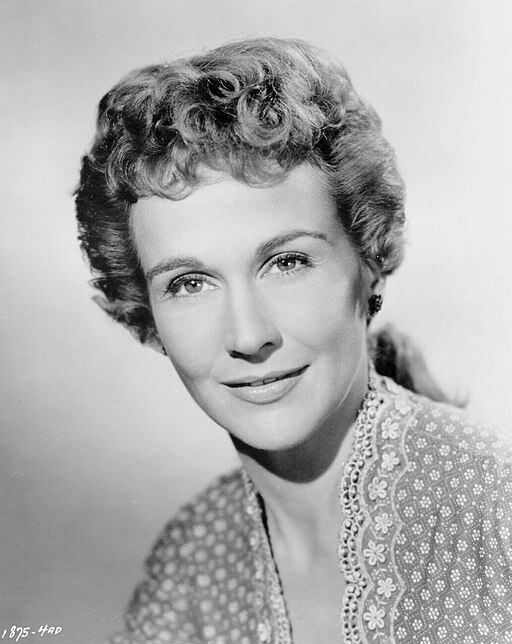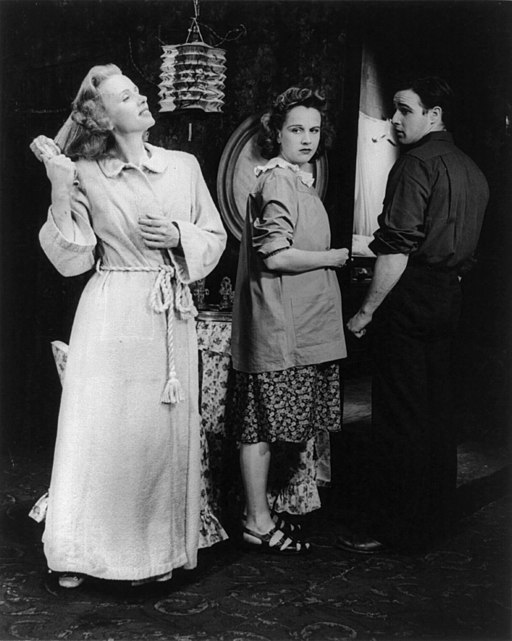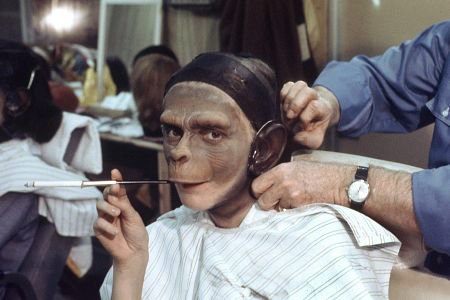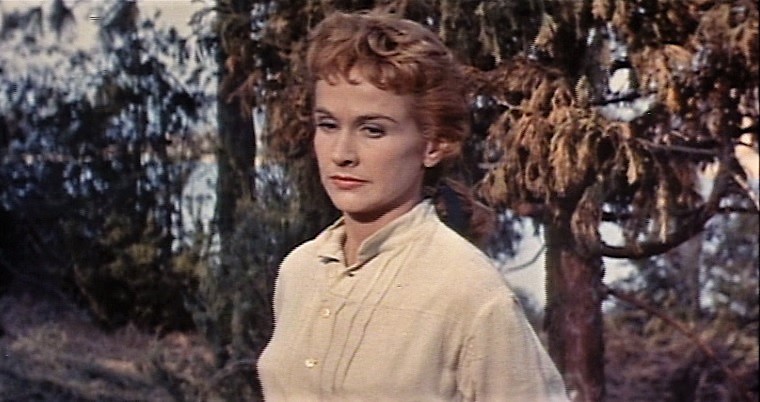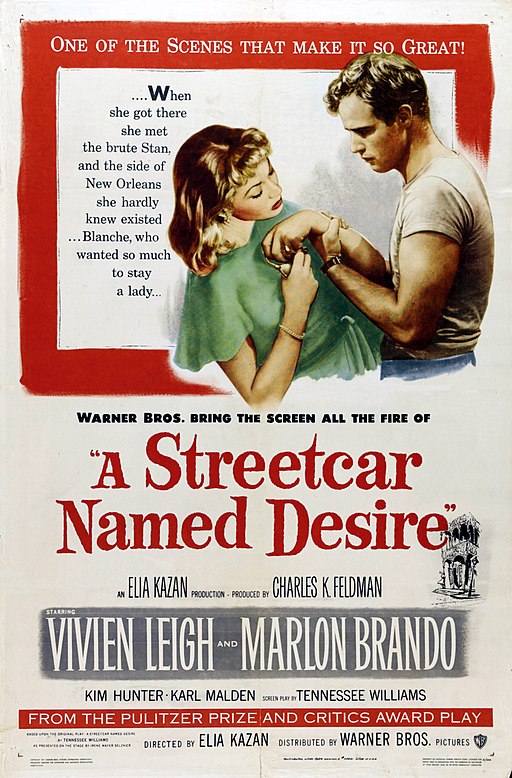Kim Hunter
back| Full Name | Janet Cole |
| Stage Name | Kim Hunter |
| Born | November 12, 1922 |
| Birthplace | Detroit, Michigan, U.S. |
| Died | September 11, 2002 |
| Buried | Woodlawn Cemetery Benning, District of Columbia, U.S. |
| Married to | William A. Baldwin (married in 1944, divorced) - Robert Emmett (married in 1951 until his death in 2000) |
| Children | Kathryn Emmett - Sean Emmett |
| Notable films | A Streetcar Named Desire (1951) - The Seventh Victim (1943) - Planet of the Apes (1968) - The Young Stranger (1957) |
Kim Hunter
The Sensitive Actress
Kim Hunter was a versatile actress whose career spanned several decades, encompassing stage, film, and television. She began her acting career on stage and made her Broadway debut in 1940.
Hunter's performance in "A Streetcar Named Desire" on Broadway caught the attention of critics and audiences alike, which she reprised in the film adaptation directed by Elia Kazan. This role established her as a prominent figure in Hollywood. Despite being blacklisted during the McCarthy era, Hunter continued to work in theatre and eventually returned to film and television, where she remained active until her later years.
Related
Kim Hunter (1922 – 2002)
Biography and Career Overview
Kim Hunter, born Janet Cole on November 12, 1922, in Detroit, Michigan, was an American actress celebrated for her profound talent and versatility across stage, film, and television. Her journey from a young aspiring actress to an Academy Award-winning star is a testament to her dedication and passion for acting.
Early Life and Aspirations Growing up in Detroit, Hunter was the daughter of Donald Cole, a refrigeration engineer, and Grace Lind, who fostered Hunter's early interest in the performing arts. After her father's untimely death, Hunter's family faced financial struggles, yet her determination to pursue acting never waned. She moved to Miami with her mother and stepfather, where she began acting in local theater productions. Hunter's passion for acting led her to New York City, the heart of America's theater scene, where she changed her name to Kim Hunter to avoid confusion with an existing Janet Cole in the Actors Equity Association.
Path to Success In New York, Hunter's career gained momentum. She trained with Sanford Meisner, one of the most respected acting teachers of the time, and made her Broadway debut in 1940. Her breakthrough came with her role in "A Streetcar Named Desire," where she played Stella Kowalski opposite Marlon Brando's Stanley. Her portrayal earned her critical acclaim and the role in the 1951 film adaptation directed by Elia Kazan, for which she won the Academy Award for Best Supporting Actress.
Hollywood and Beyond Despite her success, Hunter's career was temporarily derailed by the Hollywood blacklist during the McCarthy era, a period when she was unjustly accused of communist sympathies. This setback, however, did not deter her; she continued to work in the theater and eventually returned to film and television, showcasing her resilience and dedication to her craft. Notably, she appeared in "Planet of the Apes" (1968) and its sequel, where she played Zira, a role that introduced her to a new generation of fans.
Kim Hunter was often referred to affectionately as the "Sensitive Actress" due to her profound ability to convey deep emotional truths and complex psychological states through her performances.
Personal Life Hunter's personal life was marked by her marriages, first to William A. Baldwin, a marriage that ended in divorce, and then to actor Robert Emmett in 1951, with whom she shared a long and happy union until his death in 2000. She was a devoted mother to her two children, Kathryn and Sean. Beyond acting, Hunter was passionate about civil rights and actively supported various social causes throughout her life.
Legacy and Death Kim Hunter's career spanned over six decades, during which she remained a compelling and respected figure in the entertainment industry. She continued to act well into her later years, her passion for the craft undiminished. On September 11, 2002, Kim Hunter passed away due to a heart attack in New York City, leaving behind a legacy of memorable performances and an indelible mark on the world of acting.
Kim Hunter wins Oscar for Best Supporting Actress:
Analysis of Kim Hunter’s Acting Style:
Kim Hunter's acting style was marked by a deep emotional authenticity and a nuanced understanding of character psychology, which allowed her to deliver performances that were both compelling and deeply human. Trained in the method acting tradition, which emphasizes the use of personal experiences and emotional memories to inform character portrayals, Hunter brought a sense of realism and depth to her roles that was relatively rare for her time.
Emotional Depth and Authenticity One of the hallmarks of Hunter's acting was her ability to convey complex emotions with subtlety and depth. Whether portraying the tender vulnerability of Stella in "A Streetcar Named Desire" or the intelligent empathy of Zira in "Planet of the Apes," Hunter infused her characters with a palpable emotional authenticity. Her performances often explored the inner life of her characters, bringing out their hopes, fears, and desires in a way that resonated with audiences.
Versatility and Range Hunter's career spanned a wide range of genres, from drama and romance to science fiction and horror, demonstrating her versatility as an actress. She was as convincing playing a sensitive and loving wife in "A Streetcar Named Desire" as she was portraying a scientific ape in "Planet of the Apes." This versatility was a testament to her skillful adaptation of her acting technique to fit the demands of different roles and genres, always managing to deliver performances that were both credible and engaging.
Physicality and Voice Hunter's acting was not only defined by her emotional range but also by her use of physicality and voice to bring her characters to life. In her stage work, as well as in films, she utilized her body language and movements to express her characters' emotional states and intentions. Her voice, with its distinctive tone and modulation, added another layer to her performances, capable of conveying warmth, sternness, or vulnerability as the role demanded.
Subtlety and Complexity Hunter excelled in portraying characters with complex psychological profiles, often bringing a subtlety to her roles that invited the audience to look beyond the surface. Her characters were multifaceted, with Hunter skillfully revealing their complexities over the course of a performance. This approach allowed her to create memorable, three-dimensional characters that stood out for their realism and humanity.
Legacy and Influence Kim Hunter's acting style and dedication to her craft left a lasting impact on the world of film and theater. Her performances continue to be studied and admired for their emotional depth, authenticity, and the humanity she brought to every role. Hunter's work paved the way for future generations of actors, demonstrating the power of method acting and the importance of bringing emotional truth to every performance.
Awards and Recognition:
Academy Awards
Won: Best Supporting Actress for "A Streetcar Named Desire" (1952)
Golden Globe Awards
Won: Best Supporting Actress for "A Streetcar Named Desire" (1952)
Primetime Emmy Awards
Hunter was nominated for her work in television, but specific details about her nominations or wins at the Primetime Emmy Awards may require further verification as her most acclaimed achievements were primarily in film and theater.
Theatre World Award
Won: Theatre World Award (1947) for her performance in "A Streetcar Named Desire" on Broadway, marking her as one of the promising newcomers in the theater world.
Movies featuring Kim Hunter:
1943: "The Seventh Victim"
Synopsis: Kim Hunter makes her film debut in this horror film as Mary Gibson, a young woman who searches for her missing sister in New York City, only to discover a secret satanic cult. The movie is known for its noirish atmosphere and psychological depth.
1946: "A Matter of Life and Death" (US title: "Stairway to Heaven")
Synopsis: In this romantic fantasy film, Hunter plays June, an American radio operator who forms a connection with a British bomber pilot (played by David Niven) who should have died but survives because of a celestial mix-up, leading to a trial in heaven to decide his fate.
1951: "A Streetcar Named Desire"
Synopsis: Hunter portrays Stella Kowalski in this critically acclaimed adaptation of Tennessee Williams' play. The film delves into the complex relationships and tragic events surrounding Stella, her brutish husband Stanley (Marlon Brando), and her fragile sister Blanche (Vivien Leigh). Hunter won an Academy Award for Best Supporting Actress for her role.
1952: "Deadline – U.S.A."
Synopsis: Starring alongside Humphrey Bogart, Hunter plays Nora Hutcheson in this drama about an editor of a failing newspaper who fights to expose a gangster's crimes while dealing with his own personal and professional challenges.
1955: "The Tender Trap"
Synopsis: In this romantic comedy, Hunter plays Sylvia Crewes, a mature and independent woman involved in a love triangle with a bachelor (Frank Sinatra) and a younger woman. The film explores themes of love, marriage, and the expectations of society.
1960: "Lilith"
Synopsis: Hunter appears as Dr. Bea Brice in this drama about a young man (Warren Beatty) working at a mental hospital who becomes infatuated with Lilith (Jean Seberg), a beautiful and mysterious patient, leading to complex and troubling consequences.
1965: "The Swimmer"
Synopsis: Although not a leading role, Hunter's contribution to this film is noteworthy. The movie, starring Burt Lancaster, is about a man who decides to swim home through the pools of his neighbors, revealing various truths about his life and relationships along the way.
1968: "Planet of the Apes"
Synopsis: Hunter plays Zira, a compassionate chimpanzee scientist in this science fiction classic. The film follows an astronaut (Charlton Heston) who lands on a planet ruled by apes and struggles to survive and escape, challenging themes of humanity, civilization, and the nature of evolution.
1970: "Beneath the Planet of the Apes"
Synopsis: In this sequel to "Planet of the Apes," Hunter reprises her role as Zira. The story continues with another astronaut following the first's mission, uncovering more about the ape civilization and the planet's post-apocalyptic secrets.
1987: "The Kindred"
Synopsis: Hunter plays Amanda Hollins, a scientist who warns her son about her dangerous experiments with genetic engineering, leading to horrifying consequences. The film is a blend of science fiction and horror elements.

